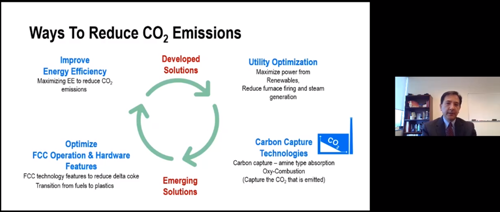IRPC Process '21: Reducing FCC emissions to meet climate targets
By Adrienne Blume, Executive Editor
Steve Shimoda, Director of the FCC Program for Technip Energies, continued Day 1 of Hydrocarbon Processing's IRPC Process virtual conference with a presentation on reducing FCC carbon footprint.
Shimoda explained how the earth's natural carbon sinks cannot keep up with the carbon emissions vented to atmosphere. Approximately 90% of earth's carbon emissions come from the combustion of fossil fuels, of which around 50% accumulates in atmosphere, contributing to the global warming of the planet. To meet the Paris Agreement's goal of limiting the rise in global temperature to 1.5°C, carbon emissions must be reduced by 1–2 B tons/year between 2020 and 2030.
To meet these targets without severely impacting quality of life for the world's population, myriad and varied solutions will be needed. A number of these solutions are still being worked out. Shimoda pointed to one solution to help cut meaningful carbon volumes from industry: FCC emissions reduction.
Refinery CO2 emissions from FCC account for approximately 15%–20% of total refinery carbon emissions and around 0.5% of total U.S. carbon emissions (as of 2019). The major sources of carbon emissions from the FCC process are coke combustion, CO boiler, feed preheat, fractionation energy, reboilers and end use of transportation fuel production.
A number of methods are available to reduce carbon emissions from these FCC-related processes. These methods include energy-efficiency improvements; optimization of operations, hardware and utilities; and retrofitting with carbon-capture technologies and equipment. Shimoda continued with a deep dive into each FCC emissions mitigation option and the technologies available to achieve the potential of these solutions.

"Some of these solutions are well-developed and understood, and others are emerging solutions, and really, to meet our [emissions reductions] targets, we're going to have to combine everything, I think," Shimoda said.
IRPC Process runs from June 2–3 and on demand for one year after the event. To view the entirety of Steve Shimoda's presentation, please visit the IRPC Process event page to view the event agenda and register for live and on-demand access to all speaker presentations.






Comments